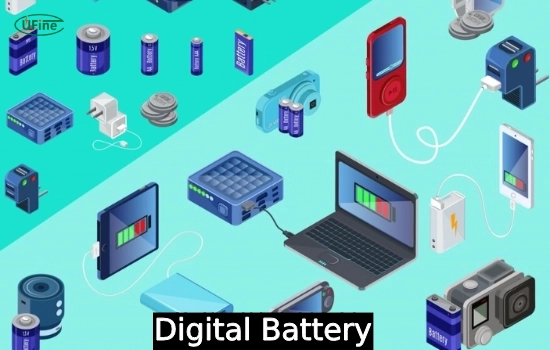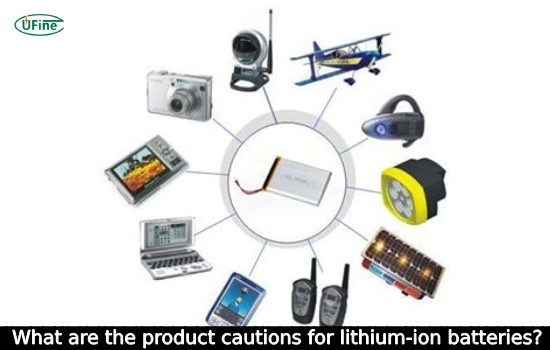Lithium batteries have become indispensable power sources in numerous industries, revolutionizing how we use and rely on portable electronic devices.
Their lightweight, high energy density and long lifespan have made them a preferred choice across various applications.
In this article, we will explore the extensive and crucial roles that lithium batteries play in powering our modern world.
Part 1. Digital battery
Laptop battery
Lithium-ion laptop batteries have evolved significantly, with Lithium-ion battery manufacturers optimizing their design for a balance between energy density, weight, and efficiency. This ensures a seamless and portable computing experience.
Fast charging capabilities:
Modern lithium-ion laptop batteries offer fast-charging capabilities, addressing the need for quick power top-ups in our fast-paced lifestyles. Users can recharge their laptops swiftly, reducing downtime and ensuring uninterrupted productivity.
iPad battery
The iPad’s lithium-ion battery is intricately integrated to support the device’s high-resolution Retina display, powerful processors, and a vast ecosystem of applications, ensuring performance without compromising on battery life.
Sustainable design:
Apple emphasizes sustainability, incorporating eco-friendly practices, including efficient battery usage and recycling programs, contributing to a more environmentally conscious approach to technology.
Wireless microphone battery
The choice of lithium batteries for wireless microphones is rooted in their reliability.
User-friendly:
Performers and presenters can move freely, knowing that the battery will provide consistent power to transmit their voices clearly and without interruptions. The compact and lightweight nature of lithium-ion batteries contributes to the overall user-friendliness of wireless microphones.
Part 2. Medical battery
Electric toothbrush battery
The electric toothbrush’s lithium battery plays a crucial role in maintaining optimal oral health. These batteries provide consistent power, ensuring effective and thorough brushing for the recommended duration.
Longevity and convenience:
Lithium batteries in electric toothbrushes are known for their extended lifespan, reducing the frequency of replacements. This not only contributes to environmental sustainability but also ensures the convenience of lasting through multiple brushing sessions before needing a recharge.
Air purifier battery
The lithium battery in air purifiers facilitates continuous operation, allowing these devices to efficiently purify the air in homes or offices. This uninterrupted functionality ensures a consistent supply of clean and fresh air.
Portability and flexibility:
Air purifiers equipped with lithium batteries offer enhanced portability. Users can easily move the purifier to different rooms or areas without the constraints of a power cord, providing flexibility in optimizing air quality.
Forehead thermometer battery
Forehead thermometers, reliant on lithium batteries, ensure accurate and quick temperature readings. The consistent power supply contributes to the precision required in medical diagnostics.
User-friendly and convenient:
Lithium batteries make forehead thermometers user-friendly by offering prolonged usage without frequent replacements. This ensures that healthcare professionals and individuals can rely on the device whenever needed, promoting health monitoring with ease.
Part 3. Industrial applications
RC Battery
Lithium batteries are extensively utilized in the world of Remote Control (RC) vehicles and aircraft. The high energy output and lightweight nature of these batteries contribute to the exceptional performance of RC vehicles, ensuring longer run times and faster speeds.
Versatility in applications:
Whether it’s a hobbyist’s small-scale RC car or a professional-grade drone, lithium batteries provide the power and flexibility needed for diverse RC applications.
Power tool battery
The use of lithium batteries in electric screwdrivers ensures precision and reliability in various industrial and construction tasks. These batteries deliver a consistent power output, allowing for controlled and accurate screwdriving.
Enhanced workplace mobility:
Electric screwdrivers powered by lithium batteries offer enhanced mobility in industrial settings. Workers can move freely without being restricted by power cords, improving efficiency and convenience on the job.
Part 4. What are the product cautions for lithium-ion batteries?
Lithium-ion batteries have become a cornerstone of modern energy storage, powering a myriad of devices across various industries. Understanding the product notes for lithium-ion batteries is crucial for optimizing their performance, ensuring safety, and prolonging their lifespan.
1. Storage and temperature considerations
Lithium-ion batteries are sensitive to temperature and storage conditions. It is recommended to store batteries in a cool, dry place, avoiding exposure to direct sunlight and extreme temperatures. High temperatures can accelerate the degradation of the battery, leading to a shorter overall lifespan.
2. Charge and discharge cycles
Each lithium-ion battery has a finite number of charge and discharge cycles. It’s essential to be mindful of these cycles as they directly impact the battery’s longevity. Lithium-ion Battery Manufacturers often specify the number of cycles a battery can undergo before experiencing a decline in performance. Regularly charging the battery before it reaches a low charge level can help extend its lifespan.
3. Compatibility with devices
It is crucial to ensure compatibility with the intended device when using lithium-ion batteries. Different devices may have specific voltage and capacity requirements. Using an incompatible battery can lead to malfunctions, reduced performance, or, in extreme cases, safety hazards. Always refer to the device’s user manual or battery specifications to ensure the right fit.
4. Transportation guidelines
Transporting lithium-ion batteries requires adherence to specific guidelines to ensure safety. When traveling, it is recommended to keep batteries in their original packaging or in a protective case to prevent short circuits. Some airlines have restrictions on carrying lithium-ion batteries in checked luggage, so it’s essential to check and comply with airline regulations.
Part 5. FAQs
-
What are lithium batteries used for most?
Lithium batteries are most commonly used in portable electronic devices such as smartphones, laptops, cameras, and electric vehicles due to their high energy density, lightweight design, and rechargeable nature. -
What destroys a lithium-ion battery?
Factors such as overcharging, exposure to high temperatures, and deep discharge can damage a lithium-ion battery. These conditions can lead to chemical reactions that compromise the battery’s capacity, performance, and safety. -
What happens if a lithium battery gets wet?
If a lithium battery gets wet, it can lead to a short circuit, potentially causing damage to the battery, compromising its performance, and posing safety risks such as overheating or leakage of harmful substances. It is crucial to keep lithium batteries dry to maintain their integrity. -
Is it safe to store lithium batteries in the house?
Generally, it is safe to store lithium batteries in the house as long as proper precautions are taken. Storing them in a cool, dry place away from direct sunlight and heat sources, avoiding physical damage, and not exposing them to extreme temperatures contribute to maintaining their safety and performance. -
Can lithium batteries fly?
Lithium batteries are allowed on flights, but there are specific regulations due to safety concerns. Passengers can typically bring lithium batteries in their carry-on luggage, but some airlines may have restrictions on spare or loose batteries. Adhering to airline guidelines is crucial, as mishandling or damage to batteries during transportation poses a risk of fire or other safety hazards.
Related Tags:
More Articles

Comprehensive Guide to Choosing the Right Cart Battery
Choosing the right cart battery ensures optimal performance and longevity. This guide covers cart battery types and helps you make an informed choice.
The Ultimate Guide to 18650 Button Top Battery
18650 button top batteries are popular for their high energy density and reliability. This guide covers their key features, usage, and maintenance tips.
The Power of Slim: Unveiling the Potential of Flat Lithium Ion Battery
Flat lithium-ion batteries power devices from phones to vehicles. This article explores their design, benefits, types, applications, charging, and safety.
The Comprehensive Guide to Battery Balancing and Battery Balancer
Battery balancing and balancers optimize performance, longevity, and safety. This guide covers techniques and tips for choosing the right balancer.
10 Key Facts About Drone Battery for 2024
Uncover crucial insights with "10 Key Facts About Drone Battery for 2024." Learn the latest trends and essential details on drone batteries.







